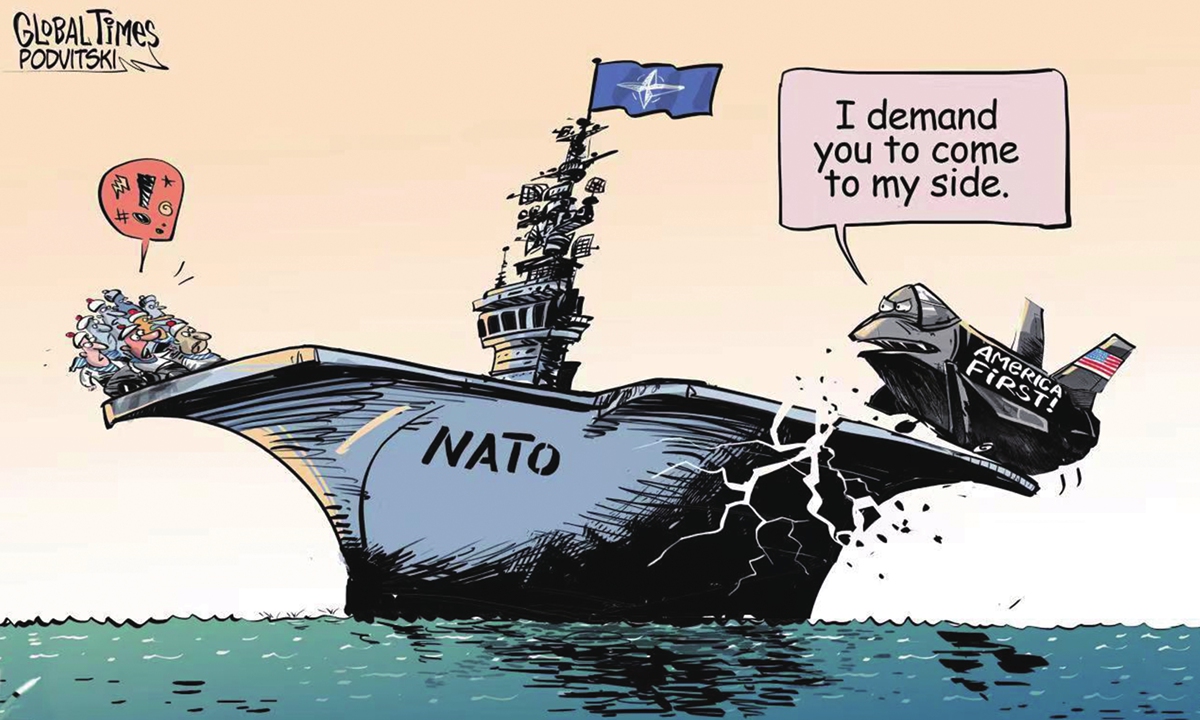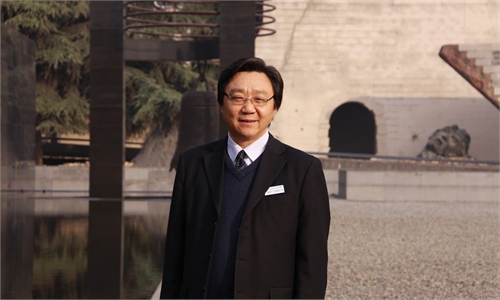FM denounces NATO as having blood of world's people on its hands after it smears China as ‘systemic challenge’ in new ‘strategic concept’

NATO alliance shows cracks under a weakening US leadership. Illustration: Vitaly Podvitski
China on Thursday expressed strong opposition and denounced NATO, after the US-led military alliance vilified China's development as "systemic challenges" in its newly released "strategic concept" for the first time, which means Beijing was targeted as one of NATO's "strategic priorities for the next decade."
Despite Russia being defined as the "most significant and direct threat" by NATO during the two-day summit in Madrid, China, which is viewed as Russia's "ally" by the West, was also among the targets of NATO's smear campaign.
Foreign Ministry spokesperson Zhao Lijian said at a Thursday press briefing that NATO's so-called new strategic concept document disregards facts, smears China's foreign policy, makes irresponsible remarks on China's normal military development and national defense policy, incites confrontation and smacks heavily of Cold War mentality and ideological bias.
China has always been a force for world peace, a contributor to global development and a defender of the international order, Zhao said. "China has never invaded any country, never launched proxy wars, nor joined or formed any military blocs."
NATO, by contrast, poses systemic challenge to world peace and stability, Zhao said, noting that NATO claims to be a regional defensive organization, but in fact is waging wars in various countries in the world and killing innocent civilians.
"NATO has the blood of their people on its hands," Zhao said. "Chinese people will never forget that 23 years ago when the US-led NATO committed the crime of bombing the Chinese Embassy in the Federal Republic of Yugoslavia, and now NATO is extending its tentacles to the Asia-Pacific region in an attempt to export the Cold War mentality and replicate the bloc confrontation in Asia."
For the first time in history, leaders of Japan and South Korea joined the NATO Summit and expressed interest in underpinning a security alliance with the US' Western allies. A 23-minute three-way summit between US, Japan, and South Korea was also held. Japanese media Kyodo News said the three leaders agreed to boost security cooperation over the Korean Peninsula issue.
South Korean and Japanese leaders also participated in a four-way summit with Australian and New Zealand leaders on Wednesday for the first time.
In the "strategic concept" document, China mainly appears in paragraphs 13 and 14. The rhetoric in paragraph 13 stresses "China threats" in terms of military build-up, cyber operations, technologies and supply chain. While in paragraph 14, NATO said the bloc "remains open to constructive engagement" with China.
"Paragraph 13 which stressed competition and confrontation with China is more about US ideas, while paragraph 14 reflects the will of some of NATO's European members," a Beijing-based expert told the Global Times on condition of anonymity.
"There is a complex situation of confrontation and engagement with China in the current process of NATO transformation. And if NATO's European members do not take the initiative to exert influence over the US, they will become a tool of American manipulation against China," the expert said.
Lü Xiang, an expert on US studies and research fellow at the Chinese Academy of Social Sciences, further explained that for all its bluster and hostility toward Russia and China, NATO's "strategic concept" does not even spell out what Europe will do if the Ukraine crisis spills over.
NATO's vilification of China serves as a backdrop to the success of the Chinese system and their anxiety about own system's "institutional failures," Lü said.
Shen Yi, a professor at the School of International Relations and Public Affairs of Fudan University, said that NATO's warning against China in its new "strategic concept" feels like "a big-sized psychopath shouting your name."
"The document seems to assume that the world belongs to NATO. But NATO's situation is like what the UK Prime Minister suggested to other leaders at the G7 meeting - be shirtless and "show our pecs." But he seems to have no well-shaped pecs to flex, Shen said.
Even if the Taiwan question was not mentioned directly in the new "strategic concept," NATO Secretary-General Jens Stoltenberg said after presenting the strategic document that China is "bullying its neighbors, threatening Taiwan," AP reported.
Experts warned that given the increasing importance of the "Taiwan card" in the US Indo-Pacific strategy, it's likely that Washington would wield influence over NATO to manipulate the Taiwan question and even create a crisis, and concentrate the resources of NATO's European members in the Asia-Pacific region.
Any attempt to undermine peace, stability, solidarity, and cooperation in the Asia-Pacific region will be opposed by the Chinese people and people of other Asia-Pacific countries, and will be doomed to fail, Zhao Lijian said.
NATO should immediately stop making groundless accusations and provocative remarks against China, abandon the outdated concept of zero-sum game, renounce its blind faith in military might and misguided practice of seeking absolute security, and abandon dangerous acts that stir up Europe and the Asia-Pacific, Zhao said.




